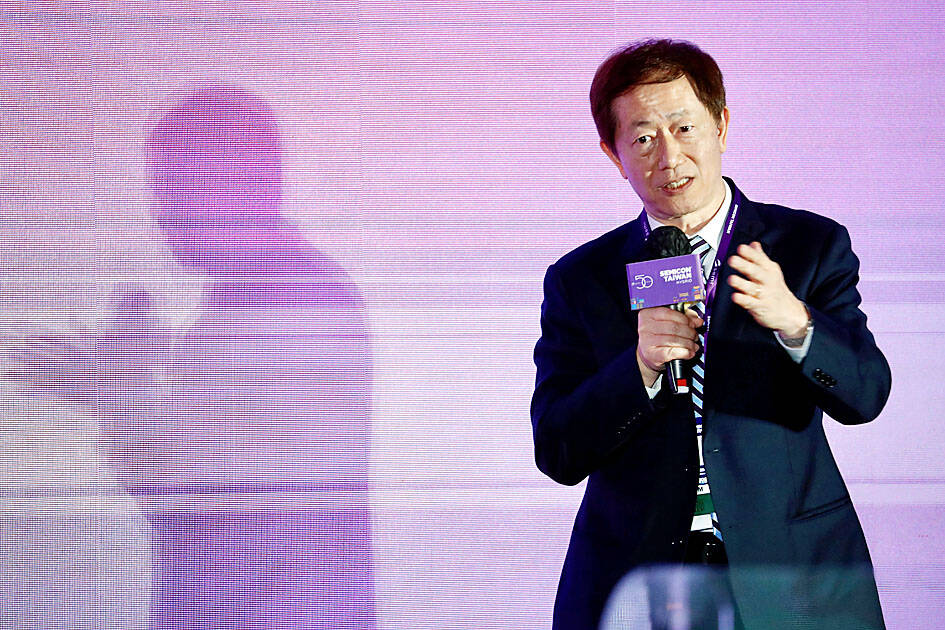Taiwan Semiconductor Manufacturing Co (TSMC, 台積電) chairman Mark Liu (劉德音) has been invited to meet with Japanese Prime Minister Fumio Kishida in Japan, the world’s largest contract chipmaker said yesterday.
In a statement, TSMC said that Liu would today attend a meeting hosted by Kishida, but did not elaborate.
The confirmation came after international news media reported a day earlier that executives from several global semiconductor giants had been invited to attend discussions at the prime minister’s office.

Photo: Ritchie B. Tongo, EPA-EFE
The firms include TSMC, Micron Technology Inc, Applied Materials Inc, International Business Machines Corp, Intel Corp, Samsung Electronics Co and Belgium’s semiconductor research group Interuniversity Microelectronics Centre, reports said.
Nikkei Asia said it is unusual for top executives from global semiconductor heavyweights to gather in one place for such a meeting.
In addition to Kishida, who is focused on enhancing Japan’s economic security and aiming to bolster the country’s semiconductor supply chain, Japanese Minister of Economy, Trade and Industry Yasutoshi Nishimura, along with other senior Japanese officials, would attend the meeting, Nikkei said.
The executives are expected to outline their investment and business development plans in Japan, it said.
Japanese Chief Cabinet Secretary Hirokazu Matsuno said it is unlikely that a single country could achieve semiconductor supply chain resilience, and it is important to work together with like-minded nations and regions to reach such a goal, Reuters reported.
The meeting comes as Washington is increasingly urging its allies to work together to address challenges from China in semiconductors and other areas of technological development, Reuters said.
TSMC is building a wafer fab in Kumamoto, Japan, with commercial production planned for next year to use its 12-nanometer, 16-nanometer and 28-nanometer processes.
In March 2021, the company established the TSMC Japan 3DIC R&D Center, a subsidiary in the Tsukuba Center of the National Institute of Advanced Industrial Science and Technology to develop high-end integrated circuit packaging and testing services with the aim of providing a one-stop service to customers using the chipmaker’s advanced chips.
The Japanese research-and-development center inaugurated a clean room facility in June last year.
TSMC said that the technologies developed by the subsidiary would enable system-level innovations to enhance computing performance and integrate more functionality, which is expected to facilitate new ways to drive semiconductor technology forward, beyond the industry’s conventional path of shrinking transistor size.

PROTECTION: The investigation, which takes aim at exporters such as Canada, Germany and Brazil, came days after Trump unveiled tariff hikes on steel and aluminum products US President Donald Trump on Saturday ordered a probe into potential tariffs on lumber imports — a move threatening to stoke trade tensions — while also pushing for a domestic supply boost. Trump signed an executive order instructing US Secretary of Commerce Howard Lutnick to begin an investigation “to determine the effects on the national security of imports of timber, lumber and their derivative products.” The study might result in new tariffs being imposed, which would pile on top of existing levies. The investigation takes aim at exporters like Canada, Germany and Brazil, with White House officials earlier accusing these economies of

Teleperformance SE, the largest call-center operator in the world, is rolling out an artificial intelligence (AI) system that softens English-speaking Indian workers’ accents in real time in a move the company claims would make them more understandable. The technology, called accent translation, coupled with background noise cancelation, is being deployed in call centers in India, where workers provide customer support to some of Teleperformance’s international clients. The company provides outsourced customer support and content moderation to global companies including Apple Inc, ByteDance Ltd’s (字節跳動) TikTok and Samsung Electronics Co Ltd. “When you have an Indian agent on the line, sometimes it’s hard

‘SACRED MOUNTAIN’: The chipmaker can form joint ventures abroad, except in China, but like other firms, it needs government approval for large investments Taiwan Semiconductor Manufacturing Co (TSMC, 台積電) needs government permission for any overseas joint ventures (JVs), but there are no restrictions on making the most advanced chips overseas other than for China, Minister of Economic Affairs J.W. Kuo (郭智輝) said yesterday. US media have said that TSMC, the world’s largest contract chipmaker and a major supplier to companies such as Apple Inc and Nvidia Corp, has been in talks for a stake in Intel Corp. Neither company has confirmed the talks, but US President Donald Trump has accused Taiwan of taking away the US’ semiconductor business and said he wants the industry back

PROBE CONTINUES: Those accused falsely represented that the chips would not be transferred to a person other than the authorized end users, court papers said Singapore charged three men with fraud in a case local media have linked to the movement of Nvidia’s advanced chips from the city-state to Chinese artificial intelligence (AI) firm DeepSeek (深度求索). The US is investigating if DeepSeek, the Chinese company whose AI model’s performance rocked the tech world in January, has been using US chips that are not allowed to be shipped to China, Reuters reported earlier. The Singapore case is part of a broader police investigation of 22 individuals and companies suspected of false representation, amid concerns that organized AI chip smuggling to China has been tracked out of nations such